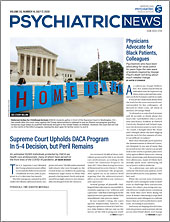Throughout our history, we have witnessed the impact that music can have on the mind, body, and soul. It is the quintessential antidote that has a proclivity for humanity and that yearns for rejuvenation, resilience, and reflection. It is the universal language that reverberates diversity, inclusion, and equity. It is cost-effective, well tolerated, and available in multiple formats. In my clinical opinion, it is the spiritual cure that is vital in helping dismantle a chronic pandemic: structural racism.
I was raised in a household and faith community in which it was commonplace to hear spirituals sung by family and friends. I can recall hearing the lyrics from Nina Simone’s “To Be Young, Gifted, and Black” and John Johnson’s “Lift Every Voice and Sing.” These, along with other hymns, hold a special place in the Black community. They provide a beacon of hope and faith that someday seeds of justice will be sown on fertile and equitable ground. They remind us of our past, our present, and our future. They encourage us to remain steadfast in our fight toward freedom.
The carnage of Black America continues to implore many questions. When will we be able to breathe without using our accessory muscles? When will we be able to kneel without feeling shackled by the same hands that pay money to see our athletic prowess on display? When will our white brothers and sisters transition out of their catatonic state to help foster dialogue and action related to criminal justice reform and health care disparities?
I have grappled with these questions knowing that the answers I seek are not simplistic. However, during this time of introspection and quarantine, I am reminded of Harry Thacker Burleigh’s famous spiritual, “There Is a Balm in Gilead.” There is a balm that Black America has been praying for incessantly for more than 400 years. The spiritual cure we seek lies in the humility of humanity.
Humility and humanity seem like foreign concepts these days. They appear to have fallen on the deaf ears of communities who march to the tune of “All Lives Matter.” These are the same communities who are blinded by their own privilege and fragility. It raises the following question: Are we motivated and willing to respect, validate, and honor the experiences of our fellow human beings?
Music does not inquire about our skin pigmentation, but it does embolden us to embrace kindred spirits from all walks of life. It provides a spiritual cleansing that involves the scales falling from our eyes to illuminate the injustices that plague our society. The pursuit of happiness and longevity for Black America is dependent on a soothing balm that welcomes everyone to an inclusive table filled with infinite love. ■

